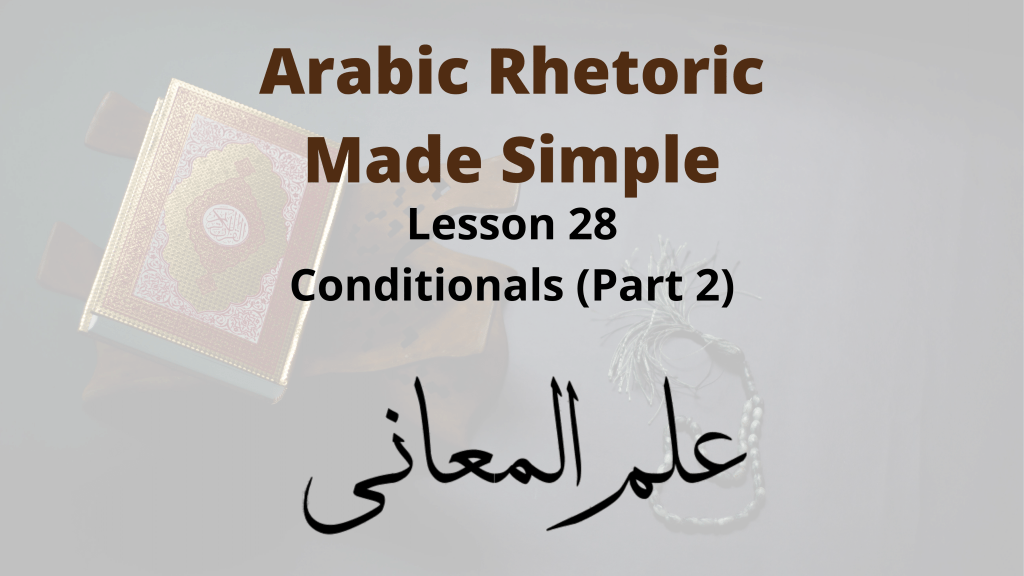In this lesson on Balagha, we are going to discuss the second anomaly from the previous session: إِنْ and إِذَا Followed by a Past Tense Verb

Table of Contents
إِنْ and إِذَا Followed by a Past Tense Verb
The anomaly we want to look at next is إِنْ and إِذَا being followed by a past tense verb. Even though you would expect a future tense verb.
Essentially you expect إن and إذا to be followed by future tense verbs because these particles are for future events.
That is true for إن. It is usually followed by a future tense verb. But it is not true for إذا. إذا is actually usually followed by a past tense verb.
Verbs in Arabic Grammar are Divided Based on Certainty (Not Tense)
In Arabic, verbs aren’t really divided into past, present and future tense, the way they are in English. I mean in English, you have “I did”, “I am doing”, “I do” and “I will do”. This division is based on past, present and future tense.
In Arabic, all you have is فَعَلْتُ and أَفْعَلُ. These aren’t divided by tense. It is not past and present/future. They are divided by certainty.
The ماضي verb inaccurately translated as the “past tense verb”, is really the verb that indicates on an event whose occurrence is absolutely certain.
The مضارع verb, inaccurately translated as the “present/future tense verb”, is really the verb in Arabic that indicates on an event whose occurrence is uncertain.
That is why the proper translation of ماضي is the perfect verb. Perfect in the sense of certain. Similarly, the proper translation of مضارع is the imperfect verb. Imperfect in the sense of uncertain.
Certainty is loosely associated to the past tense, because things that have already happened in the past, you are generally certain about them.
And uncertainty is loosely associated to the present and future, because things that are happening or are yet to happen are generally uncertain.
Actually knowing this fact goes a long way in helping you understand why certain phenomena happen in Arabic sentences.
This is exactly the reason why إذا although for future is followed by a ماضي. You translate the verb as future, because the future tense is actually coming from the word إذا. But you see ماضي, because the situation is that of certainty.
Combining إِنْ with a ماضي Verb
The next anomaly we want to look at is إن being followed by a ماضي. Even though it is for future and you would expect a مضارع.
With Kaana
This happens quite commonly when it is followed by كانَ.
For example:

Used with Haal
It also happens when it is being used in a حال situation.
For example:

In both of these cases, إن will be translated as past tense, even though its nature dictates future tense.
Make Future Event Seem Already Achieved
Another reason for إن being followed by a ماضي, is to make some future event seem like it is already been achieved. We will do this because the event seems so likely.
For example: إن جِئْتَنِي : if you visit me (and why wouldn’t you)…
There is nothing stopping you from visiting me. Although it is a future event that we are not sure it is going to happen, but what is there to stop you? Why would it not happen? We will do this because although it is yet to happen, it is as if it already happened.
For example: إنْ دَخَلَ الْجَنَّةَ : if he enters Jannah (and inshallah, he will)…
Although he has yet to enter Jannah, and it is not completely guaranteed of course, it is as if it has already happened. He is so pious, let’s just use the past tense as if it has already happened.
Foster Goodness
We do this because we want to foster goodness.
For example: إنْ دَخَلْتَ الْجَنَّةَ (if you enter Jannah…).
We are not sure if you are going to enter Jannah for sure, but you are such a great person and I want to talk to you nicely and give you good tidings, and talk very encouragingly to you. Although we don’t know if you are going to enter Jannah, let’s just assume you are.
Indicate Yearning
We do this because we yearn for something in the future, so we pretend as if it is already here.
For example: إِنْ تَخَرَّجْتُ هذِهِ السَّنَةَ (If I graduate this year…).
I don’t know if I actually will graduate this year, there is no certainty because I have to write my exams, but I want it so badly that I can just taste it. I want it to sound like it has already happened.
These are all the reasons we would use a past tense verb after إنْ, even though إنْ is for future.
Remember, even though إنْ is for doubt, ماضي is for certainty, so using إنْ plus ماضي makes something that is seemingly unachievable seem as if it has already been achieved. The translation in all of these cases is still future, but the deeper meaning is that of past and certainty.
In the next lesson we will look at the final anomaly concerning conditionals in Arabic.
- Proceed to next lesson: Conditionals in Arabic (Part 3)
- Return to index page: Intro to Ilm Ul-Ma’ani
- Start free lessons: Sign Up for Free Mini-class